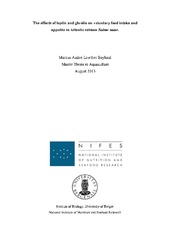The effects of leptin and ghrelin on voluntary feed intake and appetite in Atlantic salmon Salmo salar
Abstract
Salmon farming has expanded dramatically in recent years, increasing the demand for both traditional feed ingredients and alternative proteins and oils. Developing new feed requires a deep understanding of appetite, feed intake, growth, and physiology in Atlantic salmon Salmo salar. Regulation of appetite involves interactions between peripheral signals and the brain that influence feed intake and metabolism. The brain and primarily the hypothalamus produce orexigenic or anorexigenic neuropeptides that inhibit or stimulate food intake. Feed intake can also be affected by peripheral hormones, such as leptin and ghrelin. In this study individual Atlantic salmon were placed in tanks and feed intake was monitored until feed intake stabilized, after which each individual was injected intraperitoneally with recombinant salmon LEPA1 or rainbow trout Oncorhynchus mykiss GHRL1 emulsified in vegetable oil. Feed intake was monitored for a further four days after which fish were removed 4 hours after feeding for sampling. Brain, liver and stomach samples were taken for QPCR analysis of appetite related genes. Plasma samples were analysed for ghrelin, triglycerides, glucose, free fatty acids, lactate and D-3-Hydroxybutyrate. This study reports that administered rsLEPA1 causes a significant reduction in feed intake and SGR in Atlantic salmon. POMCA1 and POMCA2 expression in brain was only upregulated in fish with a significant reduction in feed intake and we suggest that POMC expression is linked to appetite reduction. Hepatic LEPA1 and LEPA2 mRNA expression was upregulated in rsLEPA1 administered fish which also showed a reduction in feed intake and growth, therefore we suggest that hepatic expression of LEP isoforms are linked to metabolism. PYY mRNA expression was down-regulated in brain tissue in fish with a significant reduction in feed intake and could be involved in the leptin- signaling pathway at a central level. Significantly higher mRNA expression of GHRL1A and GHRLIB was found in the stomach of rtGHRL administered fish compared to control, and mRNA expression of both genes was only up-regulated when plasma ghrelin levels were found to be elevated. Rainbow trout GHRL1 administered IP was not found to affect feed intake in Atlantic salmon in this study. CCKL and CCKN mRNA expression was downregulated in the brain tissue of rtGHRL administered fish which also showed elevated plasma ghrelin levels. Furthermore we have validated a method incorporating an individual based system and IP administration of hormones with minimal stress on fish which allows Atlantic salmon to resume feeding within hours of being returned to the tanks.
